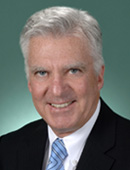
It was a day that would become engraved into the psyche of Australian political history forever. A federal leadership spill that had bubbled to the surface and festered, resulting in Kevin Rudd stepping forward to contest Julia Gillard for power. With an official ballot scheduled, the media buzz seemed almost tangible; plastered across the pages of newspapers, airwaves and television screens, the build up was impossible to ignore.
On the morning of February 27, 2012, as the media horde hovered around Canberra with wide eyes and even wider ears, awaiting the results of the ballot, the doors swung open for one man to deliver the news the entire nation was waiting on.
Caucus returning officer Chris Hayes would be that man. After calculating the votes, Hayes made his way toward a sea of cameras and flailing microphones, calmly stating ‘Julia Gillard has won the ballot 71 votes to 31’.
This address would cross live to networks across the country, informing audiences that Julia Gillard had triumphed in spectacular fashion and would remain the Labor leader.
Hayes now plays down the melodrama of that day. ‘It might have been a leadership contest but it was just another ballot,’ he states matter-of-factly, after apologising for keeping me waiting half an hour — just as he had the media that fateful morning.
‘Just another ballot. A little more prominent than other ones,’ he laughs, reflecting on the moments following the count in which the press focused on a rogue text message sent from inside the caucus that told of an incorrect count.
‘They were asking me questions as to why I had taken so long. I’d been pressed on whether I had conducted a second count or alternatively, taken an inordinate amount of time to conduct the ballot,’ he says.
He wasn’t phased about delivering the results to the public: ‘I didn’t really think about it much at the time. I addressed the media straight away so they could do their job and inform the Australian community as soon as possible.’
He needn’t have worried. Moments later the fixation shifted to Gillard’s and Rudd’s speeches, and Hayes was swept from the spotlight.
Flitting from meeting to meeting, Hayes is now a man that’s difficult to get a hold of. But how does a boy growing up in the modest outer southwest Sydney suburb of Padstow becomes interested in politics?
‘I grew up in a Brothers school which encouraged political debate, so I certainly had an involvement in politics very early,’ he recalls.
While the move into politics was not what he labels ‘a very romantic one’, it is one that he has taken on wholeheartedly. In 2005, the then business owner was asked to consider standing for the seat of Werriwa being vacated by Mark Latham; a seat that he would hold for the next four years, before nominating for Fowler in 2010. With a new found and demanding commitment to federal politics, Hayes decided the business had to go.
‘I didn’t think it would be doing the right thing in incorporating a business and trying to do the job of being an effective member of parliament,’ he says. The business required him to be a mediator, endeavouring to resolve disputes, so it’s little wonder why the transition into politics was a seamless one.
His voice is soft yet proud as he talks about his first speech to the House of Representatives: ‘Knowing many of the faces but having only seen them on TV, I wanted to give them a snap-shot of who and what makes up Chris Hayes. I spoke of my family, my business and my inspirations.’
Hayes talks about his electorate and his staff with fondness and respect.
He holds the seat of Fowler, an electorate of 95,000 people in the west of Sydney. It’s the second lowest on the socio-economic ranking in the country, and struggles with what Hayes calls the ‘bread and butter issues’, ranging from housing through to gambling, and reliance on welfare.
His electorate is the one of the most multicultural electorates in Australia, with 25 per cent of the population speaking Vietnamese at home. Hayes now employs multilingual staff in order to help the him communicate with and understand his community.
Although extremely passionate about his seat, Hayes admits that it is difficult to find balance between work and family, with demanding hours, travel and strenuous commitments.
‘I try very hard to be there for my wife Bernadette, my two sons and my daughter. Actually, my daughter and her husband, along with their four children, live with us. So I get to see them regularly.’
Hayes is pragmatic about the recent landslide in the Queensland election in which 43 Labor members lost their seats: ‘It’s one you wouldn’t want to boast about. Labor has been tarnished.’
He also believes that much of the public commentary with respect to the Prime Minister has been ‘misogynist-based’, with banners showing such slogans as ‘ditch the bitch’ and ‘Ju-liar’ widespread throughout New South Wales alone.
Despite the wounds that have since opened for Labor in the neighbouring state of Queensland, Hayes is optimistic and committed to his future in the party and the state, pressing that he intends to ‘stay around for a while, but as long as my community wants me.’
‘Does it indicate that Labor has got to do a bit of soul-searching? I think it certainly does. I hope they think I’ve been doing my best to represent them. If I have been, I’m sure they’ll reward me with their vote come next election.’
Chelsea Janson is a journalism student at La Trobe University.
To view profiles of some of the other backbenchers as part of upstart’s Backbench Insiders project, click here.






